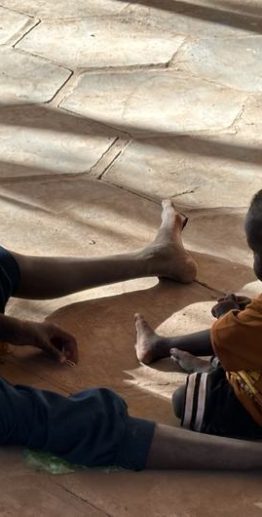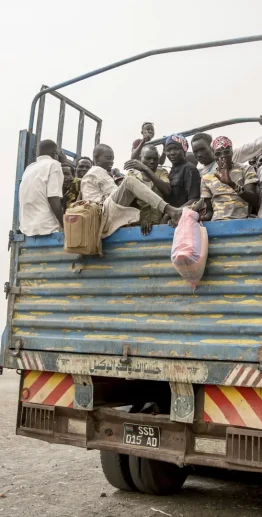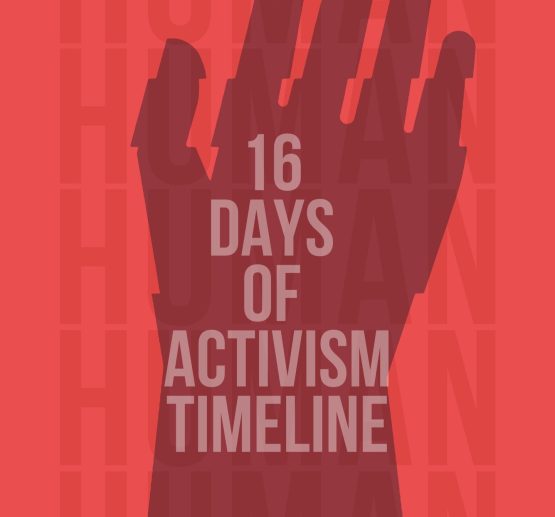Weekly Policy Statement
June 9, 2025
Dying in Silence in Darfur and Nowhere To Go!
Mass Murder, Acute Famine, and Protection Crises Increase at an Alarming Rate
In recent weeks Rapid Support Force (RSF)’s violent attacks have escalated, and the humanitarian crisis in Sudan has worsened. Famine has reached a breaking point, especially in Darfur where civilians have been forced to flee, however some remain under siege with minimal to no survival means. Attacks on civilians and the blockade of humanitarian aid for the vulnerable represent a serious affront to international human rights and humanitarian law. Hospitals and other critical infrastructure are being systematically targeted for destruction. There is even shelling of internally displaced camps, directed toward the most vulnerable survivors, some of whom have lived in makeshift camps for over two decades. The international community is failing to provide lifesaving assistance or hold perpetrators of serious international crimes accountable. The international community must act immediately to end the genocide in Sudan, deliver desperately needed humanitarian aid, and hold perpetrators accountable.
Since the April attacks on the Zamzam camp in Darfur, there has been a documented rise in mass murder, forced displacement, harassment, intimidation, and detention of displaced people with nowhere to go. This, coupled with the rise of airstrikes and attacks, marks an overall escalation of the humanitarian crisis across Sudan. Widespread violence and insecurity has triggered a hunger crisis, leaving people in famine conditions, suffering from acute malnutrition and severe water shortage. Displaced women and girls also face heightened risks of sexual violence at shelters and at illegal checkpoints as they seek safety.
In early May, fighting in the city of El Nahud in West Kordofan state killed over 300 civilians, the actual death toll likely being much higher. RSF rampaged through neighborhoods, looting and killing. It was reported that RSF has been treating detainees in a cruel and inhuman way. As UN Human Rights Chief Volker Turk said in a statement, “The horror unfolding in Sudan knows no bounds.” Control over El Nahud was a priority for both RSF and SAF, and now that it is under RSF control, they turn their attention to bid for control of El Fasher.
Displacement and Catastrophic Conditions
Over 800,000 displaced people who fled the Zamzam, Abu Shouk, and Tawila camps are living in catastrophic conditions due to lack of basic services and a near total absence of humanitarian aid. The people are seeking refuge in East Darfur, in the Khazan Jadid area. Most people are living there without shelter, there are no treatment centers or health services, and malnutrition has been reported among children. With the rainy season approaching, the risk of disease outbreaks will only increase.
Recent Atrocities and Escalations
During the first and second week of July multiple RSF attacks in El Fasher have been reported. Many people have been fleeing El Fasher on foot in search of food and water. On May 30, at least six people were killed by an RSF drone attack on Obeid International Hospital, in North Kordofan. This is a direct assault on humanitarian infrastructure, and a clear violation of international humanitarian law. On June 1st In Central Darfur, RSF opened fire in a market near the El Hamidiya camp, killing two civilians and injuring several others. Another report indicated that on June 2nd at least 89 people were killed and wounded in El Koma in North Darfur, following SAF airstrike. This is the first such attack in the region after a period of relative pause.
Reports indicate that SAF has struck multiple aircrafts transporting weapons, drones and amention through Nyala Hospital. In another report on June 4th, Human Rights Watch released a report accusing SAF of indiscriminately bombing civilian populations during airstrikes in South Darfur in February.
On June 5th, a joint humanitarian convoy (WFP and UNICEF) was attacked and burned down by the RSF near El Koma, North Darfur. Multiple trucks were burned, and critical humanitarian supplies were damaged. The convoy was en route to El Fasher leaving civilians starving to death..
On June 5th, residents of Wadi Halfa in Northern State blocked all major entrances to the town to protest scheduled power cuts, reflecting the rising civilian frustration amid ongoing infrastructure collapse.
To make matters worse, on June 9th the Trump administration declared a U.S. travel ban including Sudan went into effect, signed by President Trump. Sudanese doctors have warned that this ban will prevent medical graduates from participating in training programs in the U.S., limiting future healthcare capacity in Sudan. The ban also blocks Sudanese genocide affected refugees at a time when international refuge is most urgently needed. The African Union has condemned the move, warning it threatens years of diplomatic progress.
On June 11th, in Abu Zabad, West Kordofan State, eight people, including a child, were killed and nine injured in a drone strike on a shelter for displaced people. This direct targeting of civilians seeking refuge is a flagrant violation of international humanitarian laws.
RSF Escalation of Drone attacks in Port Sudan
RSF drones have been flying over Port Sudan almost daily, since the initial strikes between May 4th-6th. Drones hit critical infrastructure like fuel tanks, a power station, and oil depots, in port Sudan, Kassaala and Kosti in White Nile, severely disrupting essential civilian services and endangering the lives and livelihood of the Sudanese people.
A Worsening Public Health Crisis
Cholera in Khartoum: Aid workers say the effort to control the outbreak in Khartoum is deteriorating due to the collapse of health services. On June 4, officials reported 1,375 new cholera cases since May 25. This surge is linked to bombings of power stations, which have cut off access to safe drinking water, forcing residents to use contaminated sources like the Nile.
Cholera in West Darfur and Sennar: Health officials have confirmed six cases and two deaths in El Geneina. In Sennar, 153 suspected cases and nine deaths have been reported. Actual cases and deaths are likely much higher. The situation is dire due to the increased bombing of infrastructure, disrupting access to clean drinking water and medical care.
The crisis in Sudan today, particularly Darfur, is a crisis of a global magnitude that requires urgent global attention and actions. With famine increasing and the rainy season approaching, if left unaddressed the humanitarian catastrophe in Darfur and Kordofan will be the deadliest of its kind. Genocide, war crimes, and crimes against humanity have been perpetrated for over two decades. DWAG believes the solution to the crisis in Sudan must take an atrocities prevention approach that starts with civilian protection and accountability for criminals.
Therefore we urgently call on the United Nations Security Council (UNSC), the African Union, the United States, and the broader r international community to take the following urgent actions:
- Authorize urgent and unimpeded access to humanitarian aid for all in need across Sudan;
- Swiftly authorize and deploy civilian protection forces to protect the innocent Sudanese people, particularly in Darfur;
- Press the warring parties to stop the torture, murder, rape, and starvation of civilians in Darfur and across the Sudan;
- Press the warring parties to immediately cease all attacks and strictly adhere to a permanent, verifiable ceasefire;
- Impose criminal and financial accountability for all individuals and states complicit in committing past and present genocide and war crimes in Sudan;
- U.S., UNSC, and allies must hold the regional and international enablers supplying weapons to the warring parties in Sudan accountable;
- US and allies must cease the selling of arms to the UAE and prevent genocide in Sudan.
- We call on the United States to issue a waiver for Sudanese refugees, students to enter into the US without restriction
As attacks on civilians and the humanitarian crisis intensifies we must speak out and demand action. We further call on DWAG supporters to speak up and tell our leaders- in the face of genocide and the incredible suffering they must not look the other way, they must meet their moral and legal obligation by standing against genocide in Sudan. The time to act is now.
Please join our Stand with Sudan campaign to take action, support the life saving effort and rally others to be a voice for the people of Sudan.
With our collective effort we can ease the suffering, compel our leaders to act and hold those responsible accountable.
With Gratitude,
Niemat Ahmadi,
DWAG President



